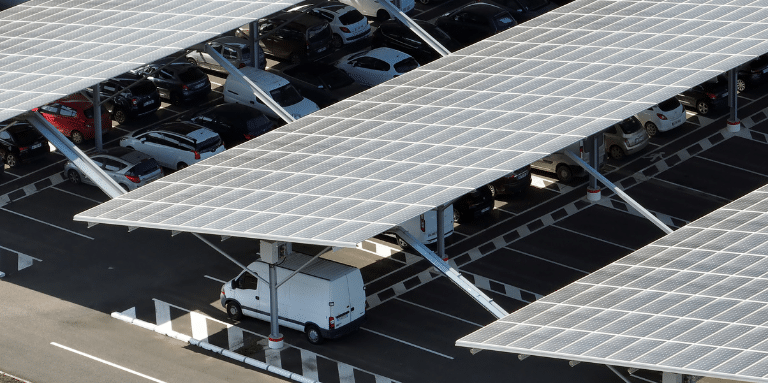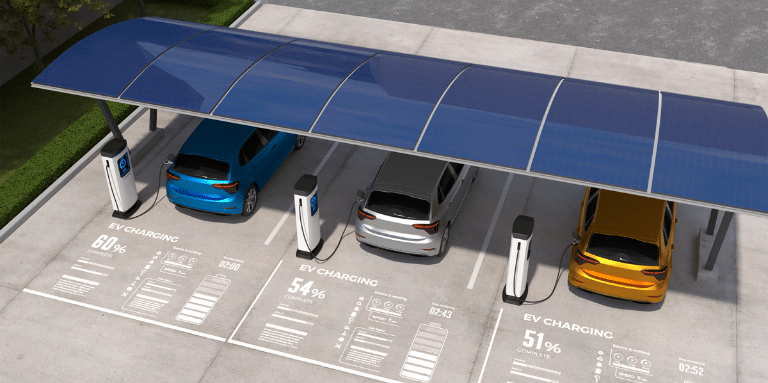Want to go electric?
Beev offers multi-brand 100% electric vehicles at the best prices, as well as recharging solutions.
Parking lots, a new space for solar energy production
How outdoor parking lots can contribute to the energy transition
Outdoor parking lots can contribute to the energy transition in a number of ways.
- Renewable energy production
The installation of photovoltaic shading systems on outdoor parking lots is an effective solution for producing renewable energy. The shades protect vehicles from the sun and rain, while generating electricity. The energy produced can be used to power adjacent buildings, recharge charging stations for electric carsor even the electricity grid.
- Reducing greenhouse gas emissions
The production of renewable energy helps reduce greenhouse gas emissions, which are responsible for climate change. The installation of photovoltaic shading systems on outdoor parking lots therefore contributes to the fight against climate change.
- Improving user comfort
Photovoltaic shading systems create a more comfortable parking space for users. They protect vehicles from the sun and rain, reducing vehicle temperatures and facilitating access in bad weather.
- Enhancing existing spaces
The installation of photovoltaic shading systems on outdoor parking lots makes it possible to add value to areas that have already been artificially developed, without the need for new development. This helps preserve natural spaces and limit urban sprawl.
In France, numerous projects to install photovoltaic shading systems on outdoor parking lots have been completed or are currently underway.
For example, the city of Paris has installed photovoltaic shading systems on the Gare de Lyon parking lot, generating around 1.5 GWh of electricity per year.
The city of Lyon has also installed photovoltaic shading on the Cité Internationale parking lot. of the Cité Internationale, generating around 1.2 GWh of electricity per year.
The energy transition is a major challenge for our society. Outdoor parking lots can make an important contribution to this transition, by producing renewable energy, reducing greenhouse gas emissions, improving user comfort and enhancing the value of existing spaces.
The ApER law, better known as the EnR law, makes it compulsory to install photovoltaic panels on outdoor parking lots.

The law on accelerating the production of renewable energies (ApER law), promulgated on March 10, 2023, makes it compulsory to install photovoltaic shades on existing and future outdoor parking lots of over 1,500 m².
Article 40 of the law stipulates that shading systems must cover at least half the surface area of the parking lot. Parking lot managers can pool the work between several adjacent parking lots, provided that they comply with the requirement to cover 50% of the total surface area of adjacent parking lots.
This obligation aims to promote the development of renewable energies, in particular photovoltaics, and reduce the environmental impact of parking lots.
Photovoltaic shading systems generate electricity while protecting vehicles from the elements and heat.
The benefits and challenges of photovoltaic panels on car parksAdd your title here
The advantages of photovoltaic shading for parking lots are numerous:
- Green electricity production: photovoltaic shading systems generate electricity from solar energy, helping to reduce greenhouse gas emissions.
- Vehicle shading: shading protects vehicles from bad weather and heat, which can extend their lifespan and reduce maintenance costs.
- Improved user comfort: shading can improve the comfort of parking lot users by providing a cooler, more pleasant place to park.
- New source of income: parking lot managers can sell the electricity generated by the shading systems, which can create a new source of income.
Photovoltaic shading also presents challenges, including :
- Investment cost: the installation of photovoltaic shading systems represents a significant initial cost.
- Lifespan: photovoltaic shading systems generally have a lifespan of 20 to 25 years.
- Maintenance: photovoltaic shading systems require regular maintenance, including cleaning of the solar panels.
- Impact on traffic: photovoltaic shading systems can have an impact on traffic, particularly by reducing vehicle visibility.
Obligation to install a parking shade: who is concerned?
The parking shade requirement applies to all existing and future outdoor parking lots over 1,500 m².
- Parking lots for companies, local authorities, public establishments, establishments open to the public (ERP) and multi-unit residential buildings.
- Parking lots at shopping centers, railway stations, airports and other transport facilities
- Parking lots for healthcare, educational and other public institutions.
Parking lots exempt from the obligation to install photovoltaic shade systems
- Historic monument parking lots.
- Parking lots on protected natural sites.
- Parking lots for sports and cultural facilities with a surface area of less than 5,000 m².
Parking lots undergoing major renovation are also exempt from the obligation, if the installation of photovoltaic shading systems is deemed economically unacceptable.
Parking lot managers are required to file a preliminary declaration of works with the town hall of the municipality in which the parking lot is located. The declaration must be accompanied by a file containing plans of the parking lot and details of the planned photovoltaic shading systems.
The deadline for retrofitting existing parking lots is July 1, 2026. The built after July 1, 2023 must be equipped with photovoltaic shading systems as soon as they are built..
In the event of non-compliance with the parking shade obligation, the parking operator is liable to a fine of €1,500 per day of delay.
How many photovoltaic panels do I need?
The number of photovoltaic panels to be installed depends on the surface area of the parking lot and the power of the photovoltaic panels chosen.
The requirement for parking lot shading means that the shades must cover at least half the surface area of the parking lot. For example, for a 3,000 m² parking lot, 1,500 m² of shade must be installed.
The power output of photovoltaic panels varies according to their technology and characteristics. On average, a 1,500 m² photovoltaic shade can produce around 300 kWp.
For a 3,000 m² parking lot, for example, you'd need to install around 100 photovoltaic panels, each with a capacity of 3 kWp.
It's important to note that these figures are only indicative. The number of photovoltaic panels to be installed must be determined by a qualified installer, based on the specific characteristics of the parking lot.
When choosing photovoltaic panels, it is important to consider the following points:
- The power of the photovoltaic panels: this determines how much electricity the panels can produce.
- Photovoltaic panel efficiency: this determines the amount of electricity produced per unit area.
- The lifespan of photovoltaic panels is generally between 25 and 30 years.
- The price of photovoltaic panels varies according to their power, efficiency and brand.
It's also important to use a qualified installer for the installation of photovoltaic shading systems. The installer must hold the RGE (Reconnu Garant de l'Environnement) label.
Fines for failing to install photovoltaic panels on parking lots?
In France, the installation of photovoltaic panels on outdoor parking lots has been mandatory since July 1, 2023. This obligation applies to parking lots with a surface area of over 1,500 m², whether public or private.
In the event of failure to comply with this obligation, the parking lot owner or operator is liable to an administrative fine. The amount of this fine is capped at :
- 20,000 per year for parking lots with a surface area of less than 10,000 m² ;
- 40,000 per year for parking lots with a surface area of 10,000 m² or more.
The fine is imposed by the prefect of the département in which the parking lot is located. It is collected by the public accountant.
In addition, the owner or operator of the parking lot may also be required to bring the installation into compliance under a penalty payment. The astreinte is a sum of money that the owner or operator must pay to the prefect every day that they fail to comply with the obligation to install photovoltaic panels.
How do I calculate the total cost of installing a photovoltaic shade?
The total cost of installing a photovoltaic shade consists of several elements:
- The cost of the photovoltaic panels: this is the most important cost, accounting for around 50% of the total. The price of photovoltaic panels varies according to their power, efficiency and technology.
- Installation costs: these include the cost of the shade structure, electrical wiring and commissioning. The cost of installation is generally between 30% and 50% of the total cost.
- Ancillary costs: these include the cost of connection to the electricity grid, administrative costs and taxes. Ancillary costs are generally between 10% and 20% of the total cost.
To calculate the total cost of installing a photovoltaic shade, multiply the price of the photovoltaic panels by the number of panels required, then add the cost of installation and ancillary expenses.
For example, for a 100 kWp shade, you'll need to spend around €20,000 on the photovoltaic panels, €20,000 on the installation and €10,000 on ancillary costs. The total installation cost is therefore €50,000.
It's important to note that the cost of installing a photovoltaic shade can vary depending on several factors, including :
- Installation location: costs are generally higher in urban than in rural areas.
- Shade size: costs are proportional to shade size.
- Shade type: fixed shades are generally less expensive than tiltable shades.
You can reduce the cost of installing a photovoltaic shade by taking advantage of the financial aid available. In France, the government offers several forms of assistance, including the "crédit d'impôt pour la transition énergétique" (CITE), the "prime à l'autoconsommation" (PAC) and the "prime à l'investissement dans les énergies renouvelables" (PIE).
Aid for the installation of photovoltaic shading systems: a more affordable investment
Installing photovoltaic shading systems in parking lots represents a major investment, which can be difficult for parking lot managers to recoup. To reduce the cost of such installations, a number of financial incentives are available, including :
The self-consumption bonus
The "prime à l'autoconsommation" (self-consumption bonus) is a government financial aid scheme that enables private individuals, professionals and local authorities to finance part of the cost of installing photovoltaic shading systems. Photovoltaic shades are structures that produce solar-generated electricity while protecting vehicles from bad weather.
Photovoltaic shading systems with a maximum capacity of 100 kWp are eligible for the self-consumption bonus. For installations over 9 kWp, the premium is paid over a five-year period, while installations under 9 kWp receive a one-off payment. The amount of the premium is determined by the public authorities and is revised quarterly.
| System power | Premium amount |
|---|---|
| ≤ 3 kWp | 370 € / kWp |
| ≤ 9 kWp | 280 € / kWp |
| ≤ 36 kWp | 200 € / kWp |
| ≤ 100 kWp | 100 € / kWp |
| ≤ 500 kWp | 0 € / kWp |
Self-consumption premium scale for Q4 2023 - valid until 31/01/2024
Surplus sale and total resale purchase tariffs
These tariffs are set by the government. They enable private individuals, professionals and local authorities who install photovoltaic panels to sell the surplus electricity they produce to the electricity grid.
| kWh feed-in tariff for surplus sales | Total sale kWh feed-in tariff | |
|---|---|---|
| ⩽ 3 kWp | 0,13€ | 0,17€ |
| ⩽ 9 kWp | 0,13€ | 0,15€ |
| ⩽ 36 kWp | 0,08€ | 0,14€ |
| ⩽ 100 kWp | 0,08€ | 0,12€ |
Photovoltaic feed-in tariff price per kWh - Q4 2023 (valid until 31/01/2024)
In addition to these public subsidies, there are also private subsidies offered by energy suppliers, banks and local authorities. These can take the form of grants, low-interest loans or guarantees.
To benefit from these subsidies, it's important to get in touch with the relevant organizations. It's also important to prepare your photovoltaic shading project carefully, to maximize your chances of obtaining subsidies.
Conclusion
The obligation to install photovoltaic panels on outdoor parking lots is an ambitious measure designed to contribute to France's energy transition. It offers significant benefits, including the production of renewable energy, the reduction of greenhouse gas emissions, improved user comfort and the enhancement of already artificialized spaces.
However, this measure also presents challenges, not least the initial investment cost, which can be high. It is therefore important to find out about the financial assistance available to reduce this cost.
If you would like to find out more aboutaid for the installation of charging stations for businesses in 2024please consult our article on the subject.
































